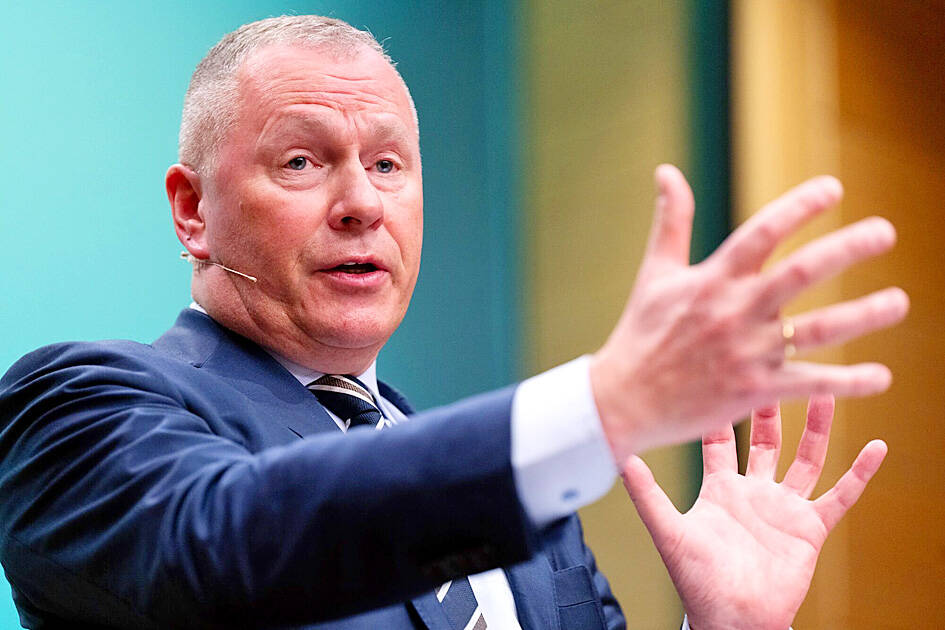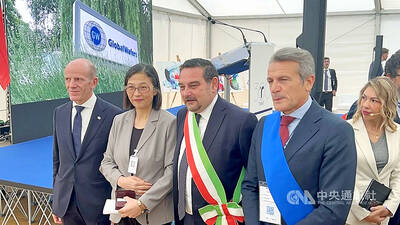Norway’s sovereign wealth fund last year returned 13 percent, or a record annual profit of US$222 billion, but missed its self-imposed target for the second year in a row despite gains from the booming US technology sector.
Norges Bank Investment Management (NBIM) — the official name of the US$1.8 trillion fund — saw investments in equities gain 18 percent last year, it said in a statement yesterday.
After the value of real-estate holdings fell, the fund missed the benchmark it measures itself against by 45 basis points, it said.

Photo: Bloomberg
The relative return was the third-worst year in percentage terms, NBIM chief executive officer Nicolai Tangen said at a press conference at Norges Bank in Oslo, Norway.
The fund’s real-estate portfolio underperformed relative to the stock market and the fund was also underweight equities, in particular the biggest US tech stocks, he said.
Even so, NBIM ended last year with a tech-heavy portfolio, with companies including Apple Inc, Microsoft Corp and Nvidia Corp among its top 10 holdings.
In recent days, the sector has been in turmoil after Chinese artificial intelligence start-up DeepSeek (深度求索) raised questions over valuations.
Tangen said that the strong performance of global stock markets in recent years will eventually come to an end.
“I just want to warn again that this will not last forever,” he added.
LIMITED LEEWAY
Though NBIM is largely an index tracker that invests according to a strict mandate overseen by Norway’s finance ministry, it seeks to make most of its limited leeway. It owns, on average, 1.5 percent of all the world’s listed companies.
Founded in the early 1990s, NBIM is tasked with thinking long-term and investing Norway’s oil and gas revenues abroad.
Having started with seed capital of about US$300 million, the fund is today the world’s biggest single owner of equities, with the bulk of its capital in publicly listed stocks.
It measures itself against a bespoke benchmark based on the FTSE Global All Cap Index for equities and Bloomberg Barclays indices for fixed income.
The fund gained 1 percent on its fixed-income investments. Its unlisted real estate holdings fell 1 percent, while the return on unlisted renewable-energy infrastructure was down 10 percent, NBIM said.
The Norwegian government deposited 402 billion kroner (US$35.6 billion) into the fund last year, short of a record set in 2022 of nearly 1.1 trillion kroner.

RECYCLE: Taiwan would aid manufacturers in refining rare earths from discarded appliances, which would fit the nation’s circular economy goals, minister Kung said Taiwan would work with the US and Japan on a proposed cooperation initiative in response to Beijing’s newly announced rare earth export curbs, Minister of Economic Affairs Kung Ming-hsin (龔明鑫) said yesterday. China last week announced new restrictions requiring companies to obtain export licenses if their products contain more than 0.1 percent of Chinese-origin rare earths by value. US Secretary of the Treasury Scott Bessent on Wednesday responded by saying that Beijing was “unreliable” in its rare earths exports, adding that the US would “neither be commanded, nor controlled” by China, several media outlets reported. Japanese Minister of Finance Katsunobu Kato yesterday also

‘DRAMATIC AND POSITIVE’: AI growth would be better than it previously forecast and would stay robust even if the Chinese market became inaccessible for customers, it said Taiwan Semiconductor Manufacturing Co (TSMC, 台積電) yesterday raised its full-year revenue growth outlook after posting record profit for last quarter, despite growing market concern about an artificial intelligence (AI) bubble. The company said it expects revenue to expand about 35 percent year-on-year, driven mainly by faster-than-expected demand for leading-edge chips for AI applications. The world’s biggest contract chipmaker in July projected that revenue this year would expand about 30 percent in US dollar terms. The company also slightly hiked its capital expenditure for this year to US$40 billion to US$42 billion, compared with US$38 billion to US$42 billion it set previously. “AI demand actually

Jensen Huang (黃仁勳), founder and CEO of US-based artificial intelligence chip designer Nvidia Corp and Taiwan Semiconductor Manufacturing Co (TSMC, 台積電) on Friday celebrated the first Nvidia Blackwell wafer produced on US soil. Huang visited TSMC’s advanced wafer fab in the US state of Arizona and joined the Taiwanese chipmaker’s executives to witness the efforts to “build the infrastructure that powers the world’s AI factories, right here in America,” Nvidia said in a statement. At the event, Huang joined Y.L. Wang (王英郎), vice president of operations at TSMC, in signing their names on the Blackwell wafer to

Taiwan-based GlobalWafers Co., the world’s third largest silicon wafer supplier, on Wednesday opened a 12-inch silicon wafer plant in Novara, northern Italy - the country’s most advanced silicon wafer facility to date. The new plant, coded “Fab300,” was launched by GlobalWafers’ Italian subsidiary MEMC Electronics Materials S.p.A at a ceremony attended by Taiwan’s representative to Italy Vincent Tsai (蔡允中), MEMC President Marco Sciamanna and Novara Mayor Alessandro Canelli. GlobalWafers Chairwoman Doris Hsu (徐秀蘭) said the investment marked a milestone in the company’s expansion in Europe, adding that the Novara plant will be powered entirely by renewable energy - a reflection of its